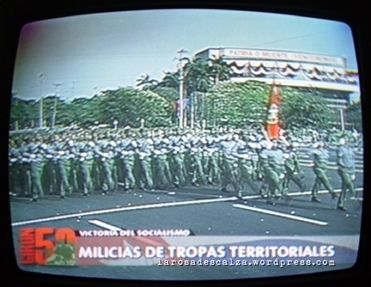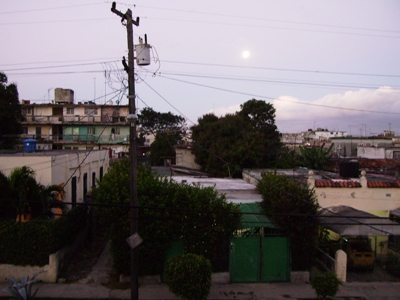May 2 2011
Category: Rosa Maria Rodriguez
Sherwood and the Council of State
Robin Hood fights against injustices and the powerful and shares the spoils taken from the rich among the poor of Sherwood Forest. The most humble are happy, but when he exhausted the fortune from “unjust enrichment”, he went to the city of Nottingham, installed himself in the castle, stripped the needy of their paltry wealth to distribute it among the poor of Yorkshire County with the result that in the end he redistributed poverty. Many suspect that his kindness and supposed solidarity was a way to hide hid inefficiency in administering the wood and his ineptitude in creating wealth. His economic stupidity is such that if Locksley were in a desert, he would long since have had to import sand.
Whether in medieval times or any times there will always be a John Lackland for the bandits.
May 2 2011
Pyongyang’s Plan
I get up, got to the mirror to brush my teeth, and discover that my eyes are slanted. I can’t turn on the light because Rafa is sleeping; I prefer to think that I didn’t sleep well and that it’s because of the shadows in the room and I leave it.
I turn on the TV to see the Literary News from the Cuban press and understand nothing, the credits are unintelligible and all the announcers have eyes like mine. Now I know! The exaggerated military focus and the cult of personality of the Maximum Leader has Koreanized the Cuban caiman.
The incapacity of reclaim rights in Korea is something that affects even the members of the Politburo. I don’t know if they receive more money than the rest of the natives, but closeness to power gives them such advantages and influence that money passes to an inferior plane. In this way they fulfill the precept of false equality in the autocracies of the left.
Beyond sarcasm, the number of times they rehearsed the parade for April 16th, when they began the commemoration of the 50th anniversary of the “Bay of Pigs Victory” was incredible. Truly, there are times I think that Cuba is North Korea.
It saddens me to think of the families that cook with kerosene or that have nothing to warm their children’s breakfast before they go to school, and how much fuel has been wasted in preparing for the march and in the march itself.
Also how, in workplaces, they are prohibited from turning on their air conditioners, despite the torrid heat of the tropics, because that have exceeded the energy conservation goal for the month. It’s this way in my production facilities and even hospitals.
But what really motivated these lines, was a personal experience I want to relate to you. Juan Manuel is a young professional working in a hospital in the capital and is a friend of my eldest son.
On Friday the 15th in the afternoon, we went by his house to see him and while there, the chair of the Committee for the Defense of the Revolution (CDR) came to demand his presence in the delegation that would go to the square the next day, representing that CDR. Our friend said he would participate for his workplace, to which the chair argued that a he must submit a paper certifying that, because if he wasn’t going to march for one or the other, he should stay and do “volunteer work” in the block along with the other neighbors who would attend.
Incredulous, we were discussing it with him and his mother, talking that these coercive gears and likely we are to hear on national television, as always happens, the interviewers talking to foreign guests about the “spontaneity” of people’s participation in the event. As if we Cubans don’t know how these “voluntary and obligatory” mechanisms that characterize the activities of this type in our country really work!
Hurrah Kim! Those who goto simulate freedom, salute you..
April 20 2011
Popularizing the Frustration
In Cuba it’s the bad word composed of the letters “pee, ar, i, cee, and kay” with which the masculine sexual organ is defined, and it’s become as common as the surnames Rodríguez, Valdés, Pérez or Hernández, and more well known than a salsa or reggaeton group of proven popularity. If we stamp our feet, it flows from the frustration of tens, dozens, hundreds and thousand; from the craziness we feel sentenced to a life in tune with the same radio soap opera, performed by the same actors, as is we have deliberately broken the radio dial to force ourselves to listen, for more than fifty years, to the same program.
Thus, the abused word spread and became so common that it’s become an interjection. Until the ’70s it was an expression used by certain social classes. The prejudiced popular stereotypes assigned it to the tenements of Old Havana, Central Havana and other so-called marginal neighborhoods.
I remember a few years ago that people looked askance at its use in the street–usually in a loud voice–and even more so if it was said by a woman. Today it has become so common that it seems strange when you don’t hear it. It’s embedded in our daily hearing and speaking and used to affirm something or someone positive as well as the complete opposite. It’s a heavyweight curse that expresses very well either discontent or pleasure, and that is stacked with others, similar, such as “you bet your f**kin’ a**,” in a popularization of the political-social machismo that still exists in Cuba.
Translated by Ariana
May 2 2011
The Impenetrable Wall of Fear
Since I was little I’ve heard countless times the use of the word fear associated with, among other things, the Cuban government. Sometimes, it comes from foreign propaganda to stigmatize the historic leaders still at the helm of Cuba, and their resistance to introducing the changes society needs, in the face of modernity and the systemic crisis that shakes all of us in the archipelago.
It seems to me that the manifestation or leaking of terribly fearful things by the Cuban high command is a recurring method they have used for years to justify the excessive levels of control, repression and coercion. Also to explain to their followers why they dismantled Cuba’s existing democratic structures when they came to power, and why Cuba remains a mobilized and militarized society even today. Their own leaders and relatives may have felt the weight of this total control that restricts, paralyzes and submerges us into helplessness. If we talk about fear, it is the only visible and permanent thing planted by the governing class in Cuban society, ever since the beginning of this process on January 1, 1959.
Actually there is a history of aggression and U.S. plans for Cuba — equally as long as the staying power of the old-fashioned Cuban leaders — to defeat the perpetual government. But these have been produced at different times in history since 1959, and it hasn’t stopped its founding, going forward, doing and growing. I want to emphasize that I am not convinced by the ancient and abused idea of “the government’s fear” before the “belligerant attitude” of the American neighbor; rather it seems to me a “manipulative political crutch” to ensure that nothing changes, to maintain the morale of the entire political military structure and to convince the real power of what must be preserved in such practices.
In short, I suspect that this enemy is a convenient excuse that provides pretexts to the Cuban government hardliners who have spent half a century in mutual verbal assault and defense. I feel that behind such stubbornness manipulation hides. The malevolent fairy of the Cuban government always waved her wand so that nothing would change, to freeze the image of a Cuba that never was. She launched the spell of the oppressor well, “to avoid greater evils,” and “to safeguard the homeland,” when in reality all they wanted was to stay in power without regard for the suffering they caused and the sociopolitical and economic disaster they have brought us. Now that they are exhausted by failure and old age, they want us to take the pill of forgetfulness and nod to these wolves as if we were sheep.
It is painful to see how they impose on us this trashy political novel riddled with partiality and pirated revolutionary melodrama, how they have hijacked the country and frozen its dreams. This is something that must be faced with “resigned courage,” while we focus on what needs to be our first and foremost objective: The democratization of Cuba and the reconciliation of the Cuban nation.
Spanish post
April 20 2011
Morning Moon Over the City
The poem wasn’t written, it was drawn in front of my terrace. Behind the battered, uneven and ugly TV antennas, the unpainted neighborhood houses, the roofs turned into storage rooms, and the hanging electrical wires, nature’s fine brushes gave us a relic of the night, a sleepy moon standing out as a white spot surrounded by moisture in the pale blue of the dawn.
It could be an image that is repeated at times; but after much struggling on the ground, I often forget to raise my eyes to the heavens, so I did not realize the singular beauty that the lazy moon can bring to a new day. Am I becoming a lunatic?
April 4 2011
Cuba’s Media War
Agent of the Empire? Me!? Of the Empire of truth, justice and rights; but most of all, agent of the empire of my freedom of conscience!
April 4 2011
CSI: Havana
http://www.todotele.com/wp-content/uploads/2008/09/logo20csi2.jpg
Freedom has disappeared. The crime occurred years ago in Cuba and they still haven’t found the culprit. The investigators discovered, in the days following the event, evidence that led to a suspect, but without a body to prove the crime, they never had a case. But they quickly mobilized the entire police force to look for some clue that would lead them to the place where she had been snatched and gagged, because initially they thought it was a kidnapping and the agents knew that in order to recover the victim alive it’s critical to find her in the first 72 hours.
The people who knew the victim, allege that she was omnipresent and so they noted her absence very quickly. The investigative process has been long and tortuous because many of the potential witnesses associated with her have left to look for her in other countries and so it has been hard for the officials to interrogate them and get their version of the facts.
Even though this alleged crime still, today, is among the “unresolved cases” of the archipelago, many haven’t stopped working on it and the long list of evidence around it lengthens. The maxim, “he who has a mobile phone is suspect,” of many police officers, was discredited by government leaders when they authorized the use of mobile phones for ordinary Cubans.
After several decades of work, some think that the authorities have given up on the case, but the independent criminal investigators, unlike those in the Interior Ministry in the capital — who have been on the case since the beginning — haven’t given up on finding who did it, who victimized all the children in Cuba, and they won’t allow the file to be closed.
The police suspect that it could be a homicide, as no one disappears for so many years without a trace. At this point in the tragedy it’s clear that a new team is needed, with focus and different viewpoints, a chance to review the experts’ notes, the DNA, the fingerprints and odors, to reassess the profile of the kidnapper or the murderer, so that working with forensic scientists they can reconstruct where the victim was last seen, and with the help of H.G.Wells’ time machine, catch the thief before we are deprived of this mother who is essential for the health of the people.
April 4 2011
Carter in Cuba Again
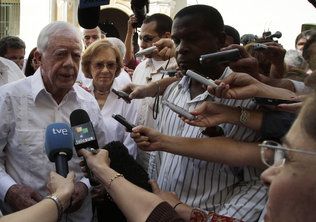 The former U.S. president, Jimmy Carter made a short but varied three-day visit to Cuba on Monday, March 28, 2011, in response to an invitation from Cuban President Raul Castro. He was greeted at the airport by Foreign Minister José Martí Bruno Rodriguez and diplomatic officials from Havana and Washington, respectively. That same day, the former president met with the Jewish community and with Cardinal Jaime Ortega y Alamino, Archbishop of Havana.
The former U.S. president, Jimmy Carter made a short but varied three-day visit to Cuba on Monday, March 28, 2011, in response to an invitation from Cuban President Raul Castro. He was greeted at the airport by Foreign Minister José Martí Bruno Rodriguez and diplomatic officials from Havana and Washington, respectively. That same day, the former president met with the Jewish community and with Cardinal Jaime Ortega y Alamino, Archbishop of Havana.
He came to our country with his wife Rosalynn, who was in charge of Cuba at the White House during his presidency (1977-1981), and directors of the Carter Center, which is based in Atlanta, Georgia. It was during his term in office, that diplomatic missions were restored in both cities and travel opportunities opened up for both peoples.
He came this time, after the Havana Provincial Court, on March 5, sentenced the U.S. citizen Alan Gross to 15 years in prison for “acts against the independence or territorial integrity of the state.” The wife of convicted Gross met with Jimmy Carter, who had traveled to North Korea last year and managed to secure the release of an American citizen; Gross’s wife hoped he might intercede to get some kind of parole for her husband for humanitarian reasons. Carter denied he was in Cuba for that purpose, although he acknowledged that he talked about the Gross case and said he wants to help improve relations between his country and Cuba.
This visit, similar in profile and tone to his previous trip in 2002, had among the objectives of the former head of state and Nobel Peace Prize laureate a chance to exchange views with Cuban leaders about the Communist Party Congress to be held April 16-19, and about the proposed economic reforms carried out to save an economy that is so close to bankruptcy it may soon be finished.
Carter, 86, is the top U.S. political figure who has visited Cuba since 1959. The former president met with prominent people from the alternative civil society such as the famous blogger Yoani Sanchez and well-known Claudia Cadelo, as well as recently released former political prisoners and their wives, the Ladies in White, and traditional dissidents such as Elizardo Sanchez and Oswaldo Payá.
Yoani Sanchez — the Cuban blogger who has received so many international awards for her blog “Generation Y” — explained that at the meeting she expressed to Jimmy Carter our need for freedom of expression and free Internet access for Cubans, which we promote and encourage from our blog with its banner supporting that demand.
April 4 2011
Internet for Cubans
By this means I want to call on the attention of all the righteous people of the world to show solidarity with the demand for internet access for Cubans. Now that Cuba has a fiber optic cable provided by the Republic of Venezuela, the pretexts to prevent us from exercising our right to freedom of information have expired. Every time you promote human rights for everyone, it is a vote in favor of free access to the “internet for Cubans.”
March 28 2011
“Unbirthday” Parties
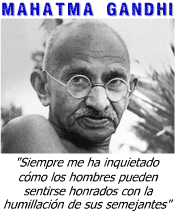 It has always disturbed me how men can feel respectable with the humiliation of their peers.
It has always disturbed me how men can feel respectable with the humiliation of their peers.
Given his age and delicate state of health, Fidel Castro has led me to think that every time he appears on National TV it’s a new birthday that, like an expected gift or anticipated party, his followers have arranged for him before a captive audience.
In his most recent appearance of February — at the time of the International Book Fair — in the company of a group of national and foreign supporters, there was everything: from showing off small and large vanities, memories and opportune forgetfulness, to new prophecies, purposes and adjectives (above all praising the boss) in advance of the August 13th birthday of the historic Cuban leader.
We could, then, find it ironic that we have a unique calendar so that they don’t judge us too harshly: a periodic calendar that allows lapses according to needs, interests and desires of the governing class. That is why it is also necessary that those of us who are a part of the alternative civil society “not be too demanding” with regards to the remaining in power of the man, because we already know that time is relative and flexible; why shouldn’t it be for us as well?
And so we received painful images of shipwrecks in praise (or flattery?) on the part of the national participants. At times I get the impression that the ex-president is a person who needs constant praise to reaffirm for himself his work and to indulge in the idolatry that for many represents his image. It is absurd that a leader who has bragged so much about himself, along with his model of government, the champion and promoter of national honor, would promote and disseminate collective humiliation. It seems that “in Wonderland” the dignity of Cubans has worth only to be wielded against “capitalism,” but when it comes to the champion, no praises should be spared…
March 28 2011
The Hot Potato
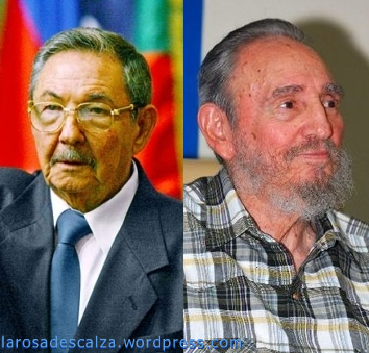
The “younger” (almost 80) of the Castro brothers — and the current president of Cuba — attempts to govern and as if playing with a ball; tossing it from hand to hand drawing a neat arc in the air. I had to get really close to realize that it was not a toy ball that the Cuban leader was tossing, but a steaming hot potato.
Yes! That polygamous tuber we like so much and that helps us eat and which is officially married to McDonald’s, Burger King, etc., “it gets hotter” with every plate that goes missing from the Cuban table, with every child or elderly person, man or simple woman, who don’t eat it for long periods due to indolence, bad management and governmental administration. And this isn’t just a current issue but a recurring phenomenon which has been ongoing for many years and in a general form.
Raúl Castro had to wait for quite a while before “the magician” decided to cede to him the stirrer for the pot where he had already tossed all his ingredients. Even so, we note that the younger of the brothers has assumed the responsibility with dedication and has put out some “good news” to the citizenry which bothers the guru a little, to the point that every once in a while he “reaches out his arm” to try to retrieve the stirrer, which is further from him the older he gets and he speaks, and this is an almost impossible task to bear for someone who already doesn’t enjoy good health.
The old wise man supervises, guides, determines … and gives the impression that he’s given up his post with conditions and reluctantly.
He allows his brother to stir the soup, “but without disturbing it much” because the components “can get hasty,” and that, in his opinion, isn’t good.
Even so, he has cast spells that threaten immobility and repetition of the for-life menu, and the society that worries about “until when?” starts to become desperate while it dreams of a better Cuba.
Evidently there are signals which confuse Cuban society and international opinion a little; and at times it might seem that it’s the historical leader who pushes the buttons on the stove where the sweet future of the homeland is being cooked and hides the recipe book that represents one of his treasures beneath his tracksuit, as if at these heights the recipes for the evidence of the broken Cuban model are interesting to anyone! But the most delicate and regrettable part of the affair — too serious to take as a joke — is at times the publication of his reflective sketches which appear to delegitimize the current leader.
He writes how he favored someone or recommended someone else — all promoted to support his own success — to the higher echelons of power
This makes many Cubans reflect about it: “If this is how he treats his own brother what will be the treatment for the rest of us?” He also flares as a critic and solves with rhetoric the “grave issues of humanity” forgetting how complex these issues are for Cuba.
I believe he should probably employ all that time understanding other topics that could improve the quality of life for the population and envisioning the solutions to the current crisis, and change his targets — at least for a moment — from the United States and those whose governments criticize him or point out the flaws in the Cuban political and social-economical system; something many assimilate as a make-believe exercise to divert focus from national problems which should be at the top of our concerns and on our list of priorities so we can later look after any other issues in the rest of the world.
His experience could be dressed with a more constructive view and more attentive attitude towards the right to help this country and his President brother.
There is another intention behind the disorienting messages around the top Cuban leaders and the presumable quarrel between them: Duality? For quite a while they have been baking a high level little cakes of a “fraternal coup d’état” to distract the world.
A syrupy sweet with expertise to look for solidarity toward the youngest of the Castro brothers, and fundamentally to win some time and security against possible real or imaginary aggressions from the planet Earth judge, who happens, by geographical coincidence and geopolitical chance, to be our neighbor.
But it is a tough pill to swallow and very few seem to enjoy it. All of these distracting maneuvers concern the Cuban citizen because it has been fifty-two years of recurrent tactics that guarantee a stronghold on power for the never-ending dictators.
I believer these treacheries are a part of the strategy of giving compliments and the pleasure of being consigned to posterity as a tough, intransigent stoic, and a long sentence of etceteras that he thinks, of course, will adorn any references to his personality in history textbooks and biographies that will undoubtedly be written around the world.
But as long as high-class rascals win, this society loses. It is a very long process where those in powers have stopped at nothing to remain in charge, leaving a trail of “everything is fair” and “the end justifies the tricks” in their long journey. This attitude has permeated all layers of Cuban society and the responsibility of the governing class in the current crisis of values that is unquestionable and unarguable.
It is not easy then for he who represents the presidency to face a corroded and rusted coffin for which he is also responsible, and for which if he doesn’t have the keys he will have to definitively break the lock to remove all the citizen hopelessness and frustrations, to avoid the violence of disqualification, and to work with boldness and dedication for the happiness of this suffering nation, for the perfecting of a government system that is fair and concerned for the well-being of all citizens rather than just concerned for keeping the privileges and influences of a small group in power.
February 21 2011
Death Penalty for Internet in Cuba?
 A ghost runs around Cuba: the Internet ghost. A month after the arrival of fiber optics from Venezuela to create a much faster information and telecommunications highway — some media outlets are predicting speeds three thousand percent faster — the government seems to be looking for excuses to justify why, once again, it will continue violating our most basic rights, preventing us from freely accessing information from our homes through Internet.
A ghost runs around Cuba: the Internet ghost. A month after the arrival of fiber optics from Venezuela to create a much faster information and telecommunications highway — some media outlets are predicting speeds three thousand percent faster — the government seems to be looking for excuses to justify why, once again, it will continue violating our most basic rights, preventing us from freely accessing information from our homes through Internet.
Until recently the government alleged it couldn’t open up Internet to the “entire population” because, as a result of the US Embargo, Cuba was accessing Internet via satellite (Wi-Fi), slowing down connection speeds. This argument has been heavily debated in diverse sectors who, in spite of not being experts, question why the country didn’t expand its contract with satellite providers and installed additional servers to diversify the possibilities and provide and widen the service offering to a larger number of users. Also, if connections are truly that slow, why not give us the possibility, just like foreigners living in the country, to pay for access in spite of its slowness? Why marginalize fellow compatriots?
It seems that the rationale of this elite — mostly “angry” (irritated and tense) — which prevents us from browsing the Web is to continue discriminating and dividing our society with its repeated practice of extortion and influence; and they use the access to the net as one of the perks they usually give grant to their hardcore followers who are employed in key positions or positions of interest for the power elite.
I share the idea of ending the U.S. “blockade” or embargo against Cuba, but I also want to end the mental blockade of those in power, who pretend to be more interested in “breaking the blockade” of independents — who dare to use our freedom of expression with “fists and pens” — and in violating the right to information of the Cuban people. Working so everyone enjoy the technological advances they enjoy and defending the access to these sources of information that is also part of our rights, as it is part of our culture and general knowledge, and enriches, complements, and consolidates the cognitive universe.
Since the announcement that we would be able to access broadband Internet, people on different television shows were optimistic about the possibility of providing the masses with that tool that frees them. They begun to expound on the importance of Internet in culture, as a research tool to find all sorts of information, as a tool for the development and diversification of economic projects, etc.
At the XIV Convention and International Fair of Informatics 2011 hosted this past February in Havana there was evidence of the natural social appetite, but apparently protests in Egypt and other Middle Eastern countries have sparked fear in the authoritarian Cuban oligarchy, and again, freedom was sentenced to death by shooting.
This is why it is becoming harder for them to support the argument of the benefits and justice of the Cuban political model, the respect of Cubans’ rights, and find themselves forced to put together television programs with the same old and abused arguments.
If the Internet is a poison, the best antidote against it is democracy, and the best antivirus to detect and discern any malicious code is culture, education, and freedom. Hence, the reiterated public assertion of government leaders stating that Cuba is the most educated and cultivated country in the world is a clear contradiction that no one understands.
If we are so smart, why can’t we access alternative information sources separate from the central state? Education and culture, to be true and not just propaganda, must be divorced from censure. Many of us wonder how can some have so much power and so much fear at the same time.
We know the government erected its flags over the pillars of health and education — both things currently in crisis — in the militarization of society and excessive and efficient (for them) control. It has been an easy feat without political parties, real unions — ones that answer to the needs of workers rather than administrators or the only political party — or an organized civil society looking for real solutions to their problems and capable of organizing and facing its challenges.
It has been a model disloyal to all ethical standards of governability. How easy it was ruling without alternatives to elect, more attractive political agendas to support, or even other points of view to listen to! How angry they must be for not being able to control the Internet they way they controlled the printed press, the radio, and the TV in the 60s! But modernity and technological advances are winning the battle, and every time they repeal any of the civil rights they, they become violators in the eyes of their own fellow countrymen.
There is no need for anyone to point at the facts: they are their own defense lawyers, but also their own prosecutors. The fact of the matter is that, as usual, they need to create the illusion of a plaza under siege to justify to their followers the reasons behind a new act of injustice. It is likely that the purpose is to condemn the Internet to life in prison without right to appeal. I hope I am wrong! but if the Cuban government is attempting to switch that light off, they might get away with it for some time, but I doubt they will be able to keep censorship forever.
March 21 2011
Ready for the Verdict

Last Saturday, the 5th of March, with the deployment of a strong political operation, the trial of US citizen Alan Phillip Gross ended, ready for the verdict. The 10th of October Municipal Court, located at #501 Carmen on the corner of Juan Delgado, in the capital neighborhood of La Víbora, was the scene for this process.
Mr. Gross was accused of the crime “Acts against the independence or the territorial integrity of the state” and the prosecutor asked for a sentence of twenty years imprisonment. The representatives of the foreign press that waited there from the day before to get images and I, an independent national reporter, were present; we were frustrated by waiting for hours and losing the opportunity to photograph him. Apparently he was transported in a white van, from the side door, and left at full speed.
Now we are left to wait for the outcome and the “trial of the trial” that ordinarily we cover fully with regards to the guarantees of the judicial process in general.
March 7 2011
Podcast for March 8, International Women’s Day
Message for International Women’s Day
March 8, 2011

